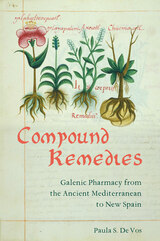
Compound Remedies examines the equipment, books, and remedies of colonial Mexico City’s Herrera pharmacy—natural substances with known healing powers that formed part of the basis for modern-day healing traditions and home remedies in Mexico. Paula S. De Vos traces the evolution of the Galenic pharmaceutical tradition from its foundations in ancient Greece to the physician-philosophers of medieval Islamic empires and the Latin West and eventually through the Spanish Empire to Mexico, offering a global history of the transmission of these materials, knowledges, and techniques. Her detailed inventory of the Herrera pharmacy reveals the many layers of this tradition and how it developed over centuries, providing new perspectives and insight into the development of Western science and medicine: its varied origins, its engagement with and inclusion of multiple knowledge traditions, the ways in which these traditions moved and circulated in relation to imperialism, and its long-term continuities and dramatic transformations. De Vos ultimately reveals the great significance of pharmacy, and of artisanal pursuits more generally, as a cornerstone of ancient, medieval, and early modern epistemologies and philosophies of nature.
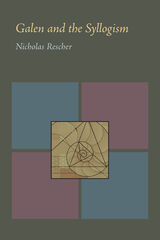

In the 1850s, "Drapetomania" was the medical term for a disease found among black slaves in the United States. The main symptom was a strange desire to run away from their masters. In earlier centuries gout was understood as a metabolic disease of the affluent, so much so that it became a badge of uppercrust honor—and a medical excuse to avoid hard work. Today, is there such a thing as mental illness, or is mental illness just a myth? Is Alzheimer's really a disease? What is menopause—a biological or a social construction?
Historically one can see that health, disease, and illness are concepts that have been ever fluid. Modern science, sociology, philosophy, even society—among other factors—constantly have these issues under microscopes, learning more, defining and redefining ever more exactly. Yet often that scrutiny, instead of leading toward hard answers, only leads to more questions. Health, Disease, and Illness brings together a sterling list of classic and contemporary thinkers to examine the history, state, and future of ever-changing "concepts" in medicine.
Divided into four parts—Historical Discussions; Characterizing Health, Disease, and Illness; Clinical Applications of Health and Disease; and Normalcy, Genetic Disease, and Enhancement: The Future of the Concepts of Health and Disease—the reader can see the evolutionary arc of medical concepts from the Greek physician Galen of Pergamum (ca. 150 ce) who proposed that "the best doctor is also a philosopher," to contemporary discussions of the genome and morality. The editors have recognized a crucial need for a deeper integration of medicine and philosophy with each other, particularly in an age of dynamically changing medical science—and what it means, medically, philosophically, to be human.

Antiquity’s most prolific and influential medical writer and practitioner.
Galen of Pergamum (129–?199/216), physician to the court of the emperor Marcus Aurelius, was a philosopher, scientist, medical historian, theoretician, and practitioner who wrote forcefully and prolifically on an astonishing range of subjects and whose impact on later eras rivaled that of Aristotle. Galen synthesized the entirety of Greek medicine as a basis for his own doctrines and practice, which comprehensively embraced theory, practical knowledge, experiment, logic, and a deep understanding of human life and society.
His treatise Hygiene, also known as “On the Preservation of Health” (De sanitate tuenda), was written during one of Galen’s most prolific periods (170–180) and ranks among his most important and influential works, providing a comprehensive account of the practice of preventive medicine that still has relevance today. Also included in this two-volume edition are two shorter treatises on the relationship between health and wellness. Thrasybulus explores the theoretical question of whether hygiene is part of medicine or gymnastics, and in so doing delineates the interrelated roles of doctors and physical therapists. On Exercise with a Small Ball strenuously advocates that activity’s superiority to all other forms of exercise.

Antiquity’s most prolific and influential medical writer and practitioner.
Galen of Pergamum (129–?199/216), physician to the court of the emperor Marcus Aurelius, was a philosopher, scientist, medical historian, theoretician, and practitioner who wrote forcefully and prolifically on an astonishing range of subjects and whose impact on later eras rivaled that of Aristotle. Galen synthesized the entirety of Greek medicine as a basis for his own doctrines and practice, which comprehensively embraced theory, practical knowledge, experiment, logic, and a deep understanding of human life and society.
His treatise Hygiene, also known as “On the Preservation of Health” (De sanitate tuenda), was written during one of Galen’s most prolific periods (170–180) and ranks among his most important and influential works, providing a comprehensive account of the practice of preventive medicine that still has relevance today. Also included in this two-volume edition are two shorter treatises on the relationship between health and wellness. Thrasybulus explores the theoretical question of whether hygiene is part of medicine or gymnastics, and in so doing delineates the interrelated roles of doctors and physical therapists. On Exercise with a Small Ball strenuously advocates that activity’s superiority to all other forms of exercise.
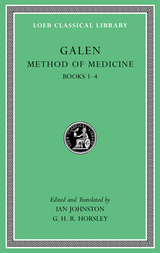
Antiquity’s most prolific and influential medical writer and practitioner.
Galen of Pergamum (129–?199/216), physician to the court of the emperor Marcus Aurelius, was a philosopher, scientist, and medical historian, a theoretician and practitioner, who wrote forcefully and prolifically on an astonishing range of subjects and whose impact on later eras rivaled that of Aristotle. Galen synthesized the entirety of Greek medicine as a basis for his own doctrines and practice, which comprehensively embraced theory, practical knowledge, experiment, logic, and a deep understanding of human life and society.
Method of Medicine is a systematic and comprehensive account of the principles of treating injury and disease and one of Galen’s greatest and most influential works. Enlivening the detailed case studies are many theoretical and polemical discussions, acute social commentary, and personal reflections. The Loeb Method of Medicine is in three volumes.
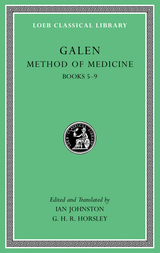
Antiquity’s most prolific and influential medical writer and practitioner.
Galen of Pergamum (129–?199/216), physician to the court of the emperor Marcus Aurelius, was a philosopher, scientist, and medical historian, a theoretician and practitioner, who wrote forcefully and prolifically on an astonishing range of subjects and whose impact on later eras rivaled that of Aristotle. Galen synthesized the entirety of Greek medicine as a basis for his own doctrines and practice, which comprehensively embraced theory, practical knowledge, experiment, logic, and a deep understanding of human life and society.
Method of Medicine is a systematic and comprehensive account of the principles of treating injury and disease and one of Galen’s greatest and most influential works. Enlivening the detailed case studies are many theoretical and polemical discussions, acute social commentary, and personal reflections. The Loeb Method of Medicine is in three volumes.
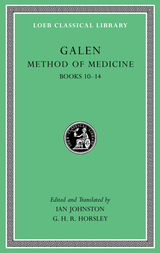
Antiquity’s most prolific and influential medical writer and practitioner.
Galen of Pergamum (129–?199/216), physician to the court of the emperor Marcus Aurelius, was a philosopher, scientist, and medical historian, a theoretician and practitioner, who wrote forcefully and prolifically on an astonishing range of subjects and whose impact on later eras rivaled that of Aristotle. Galen synthesized the entirety of Greek medicine as a basis for his own doctrines and practice, which comprehensively embraced theory, practical knowledge, experiment, logic, and a deep understanding of human life and society.
Method of Medicine is a systematic and comprehensive account of the principles of treating injury and disease and one of Galen’s greatest and most influential works. Enlivening the detailed case studies are many theoretical and polemical discussions, acute social commentary, and personal reflections. The Loeb Method of Medicine is in three volumes.

Antiquity’s most prolific and influential medical writer and practitioner.
Galen of Pergamum (129–?199/216), physician to the court of the emperor Marcus Aurelius, was a philosopher, scientist, medical historian, theoretician, and practitioner who wrote forcefully and prolifically on an astonishing range of subjects and whose impact on later eras rivaled that of Aristotle. Galen synthesized the entirety of Greek medicine as a basis for his own doctrines and practice, which comprehensively embraced theory, practical knowledge, experiment, logic, and a deep understanding of human life and society.
This volume presents three works of the greatest importance to Galen’s theory and practice of medicine. On Temperaments sets out Galen’s concept of the combination (krasis) of the four elemental qualities (hot, cold, wet, and dry), which is fundamental to his account of the structure and function of the human body and of animal and plant bodies generally, and is in turn essential to his theory of medical practice. The two related works, On Non-Uniform Distemperment and The Soul’s Traits Depend on Bodily Temperament, deal with specific aspects of dyskrasia, which is a disturbance in the combination of these qualities. Appended are two related short treatises, On the Best Constitution of Our Body and On Good Bodily State.

Antiquity’s most prolific and influential medical writer and practitioner.
Galen of Pergamum (129–?199/216), physician to the court of the emperor Marcus Aurelius, was a philosopher, scientist, and medical historian, a theoretician and practitioner, who wrote forcefully and prolifically on an astonishing range of subjects and whose impact on later eras rivaled that of Aristotle. Galen synthesized the entirety of Greek medicine as a basis for his own doctrines and practice, which comprehensively embraced theory, practical knowledge, experiment, logic, and a deep understanding of human life and society.
In the three classic works in this volume, On the Constitution of the Art of Medicine, The Art of Medicine, and A Method of Medicine to Glaucon, Galen covers fundamental aspects of his practice in a lucid and engaging style designed to appeal to a broad audience.

Antiquity’s most prolific and influential medical writer and practitioner.
If the work of Hippocrates is taken as representing the foundation upon which the edifice of historical Greek medicine was raised, then the work of Galen, who lived some six hundred years later, may be looked upon as the summit of the same edifice.
He was born in Pergamum AD 129, and both there and in other academic centers of the Aegean pursued his medical studies before being appointed physician to the Pergamene gladiators in 157. Becoming dissatisfied with this type of practice he emigrated to Rome, where he soon won acknowledgement as the foremost medical authority of his time and where, with one brief interruption, he remained until his death in 199.
Galen’s merit is to have crystallized or brought into focus all the best work of the Greek medical schools which had preceded his own time. It is essentially in the form of Galenism that Greek medicine was transmitted to after ages.
READERS
Browse our collection.
PUBLISHERS
See BiblioVault's publisher services.
STUDENT SERVICES
Files for college accessibility offices.
UChicago Accessibility Resources
home | accessibility | search | about | contact us
BiblioVault ® 2001 - 2024
The University of Chicago Press









